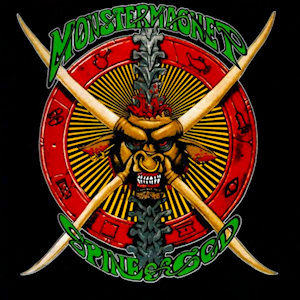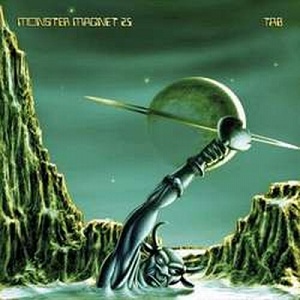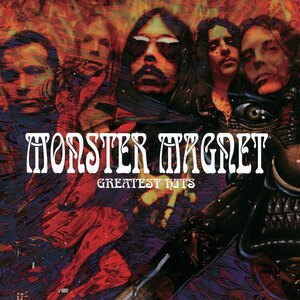
Monster Magnet is an American rock band, founded in Red Bank, New Jersey in 1989 by Dave Wyndorf, John McBain (guitar) and Tim Cronin. The band has since gone through several lineup changes, leaving Wyndorf as the only constant member. Monster Magnet has released eleven studio albums to date, and are best known for their 1990s hits "Negasonic Teenage Warhead" and "Space Lord". The band has also been credited for developing and popularizing the stoner rock genre, along with Masters of Reality, Kyuss, Fu Manchu and Sleep.

Rage Against the Machine is the debut studio album by American rock band Rage Against the Machine. It was released on November 3, 1992, by Epic Records, one day after the release of the album's first single, "Killing in the Name". The album was based largely on the band's first commercial demo tape of the same name, completed 11 months prior to the album's release. The tape contained earlier recordings of seven of the ten songs.

Dopes to Infinity is the third album by American rock band Monster Magnet, released on March 21, 1995. The album includes the song "Negasonic Teenage Warhead", the band's first hit single.

Spine of God is the debut studio album by American rock band Monster Magnet, released in Europe in 1991 and in the United States the following year. The album represents one of the earliest examples of the emerging 1990s sub-genre of stoner rock. Spine of God did not perform well commercially upon its initial release, but was praised by critics and would later be considered a major influence on stoner rock bands. The song "Medicine" was released as a single with accompanying music video.

Superjudge is the second full-length album by American rock band Monster Magnet, released on April 6, 1993. It is the first Monster Magnet album to feature lead guitarist Ed Mundell, who replaced founding member John McBain in 1992. The album was not a commercial success upon release, but would later become an influential release in the stoner rock genre alongside the band's debut album, Spine of God. The tracks "Twin Earth" and "Face Down" were released as singles with accompanying music videos.

Too High to Die is the eighth studio album by American rock band the Meat Puppets. The album was released on January 25, 1994, by London Records. It was produced by Butthole Surfers guitarist Paul Leary. The album's title is a parody of The Ramones' 1984 album Too Tough to Die.

David Albert Wyndorf is an American musician, best known as the lead vocalist and rhythm guitarist of hard rock band Monster Magnet. He is the band's frontman, songwriter and only remaining founding member. Monster Magnet has released eleven studio albums and is considered one of the pioneers of the stoner rock genre. Prior to forming Monster Magnet, Wyndorf was the frontman of punk band Shrapnel.

Tab is the second EP by American rock band Monster Magnet, released in 1991. Initially released only in Europe, it was recorded before the band's 1991 debut full-length album Spine of God and was not released in North America until after the group's 1993 album Superjudge became a minor hit. The EP is generally viewed as Monster Magnet's most psychedelic release, with the first two tracks alone totaling almost 45 minutes.

God Says No is the fifth studio album by American rock band Monster Magnet. It was released in the United Kingdom on November 12, 2000, and in the United States on April 10, 2001. It was a commercial failure compared to their previous album, Powertrip. It was their last release recorded for A&M Records, due to problems with promotion of the album but it reached #17 in Germany. It would also be the last release with bassist Joe Calandra and drummer Jon Kleiman.

Monolithic Baby! is the sixth studio album by American rock band Monster Magnet, released in 2004. It is a follow-up to 2000's God Says No. It would also be the first album featuring bassist Jim Baglino. Bob Pantella was hired to fill the band's drum position after the album's recording; the drums on the album were performed by Michael Wildwood.

Greatest Hits is a compilation album by American rock band Monster Magnet, released in 2003 through A&M Records. The first disc contains the band's best-known material, and includes tracks from 1991's Spine of God up until their 2000 release God Says No, while the second disc contains the band's music videos, a few B-sides and rarities.

4-Way Diablo is the seventh studio album by American rock band Monster Magnet, released in November 2007. The album was recorded between 2006 and 2007, following frontman Dave Wyndorf's overdose on anxiolytics in February 2006. 4-Way Diablo sold 1,800 copies on its first week of release in the United States and is the band's first album since Dopes to Infinity (1995) to not feature guitarist Phil Caivano.

"Space Lord" is a 1998 single by American rock band Monster Magnet from the album Powertrip. The song is in the key of C minor. It brought them mainstream success, with its accompanying music video directed by Joseph Kahn. The song peaked at number three on the Billboard Mainstream Rock Songs chart, and number twenty-nine on the Billboard Alternative Songs chart. A remixed version of the song was also made, and was featured on their compilation album Greatest Hits. The music video is notable for being the first video ever aired on MTV's Total Request Live on September 14, 1998. It appeared on the countdown five times climbing no higher than the No. 7 position.

Mastermind is the eighth studio album by American rock band Monster Magnet, released on October 25, 2010. It debuted at No. 165 on the Billboard 200 selling around 3,000 copies, becoming the band's first album since 2001's God Says No to chart on the Billboard 200. Mastermind was the final album to feature long-time lead guitarist Ed Mundell and bassist Jim Baglino. The album marked the return of guitarist Phil Caivano after his four-year hiatus. A video for the first single, "Gods and Punks", was released on October 1, 2010.

Last Patrol is the ninth studio album by American rock band Monster Magnet, released on October 15, 2013. It is the band's first recording since their 1991 debut album Spine of God to not feature long-time member Ed Mundell who left the band shortly after their 2010 album Mastermind. Last Patrol sold around 2,300 copies in the United States in its first week of release, peaking at number 188 on the Billboard Top 200. The band would perform the entire album for each show of the European leg in January and February 2014.
Shrapnel was an American punk and power pop band formed in Red Bank, New Jersey in the late-1970s, when its members were still teenagers.

Milking the Stars: A Re-Imagining of Last Patrol is a remix studio album by the American rock band Monster Magnet, released on November 14, 2014. According to frontman Dave Wyndorf, the album is a "reimagined" version of their previous album, 2013's Last Patrol, featuring four new songs and two live tracks. The album is not strictly a remix of Last Patrol, as songs feature new recordings and arrangements aimed at giving the album what Wyndorf describes as "a weird 1960s vibe". The album concludes with two live tracks recorded at the AB in Brussels in 2014, and which feature the debut performance of the band's new bassist, Chris Kosnik.

Cobras and Fire is a redux studio album by the American rock band Monster Magnet, released on October 9, 2015. The album is a reworking of material previously included on their album 2010 Mastermind. It is the band's second release focusing on reworking material from a studio album following their 2014 remix album Milking the Stars: A Re-Imagining of Last Patrol.

A Better Dystopia is the eleventh studio album by the American rock band Monster Magnet. The album was released on May 22, 2021, by Napalm Records. It is a cover album, being mostly made up of songs from psychedelic rock and garage rock bands of the 1960s and 1970s.

Mindfucker is the tenth studio album by the American rock band Monster Magnet, released on March 23, 2018, through Napalm Records. Frontman Dave Wyndorf described the band's recent albums as "long-form psych records that were decidedly melancholy" and chose to make a return to a more rock-oriented sound for Mindfucker. The album yielded two singles, "Mindfucker" and "Ejection", the latter being a Robert Calvert cover.



















